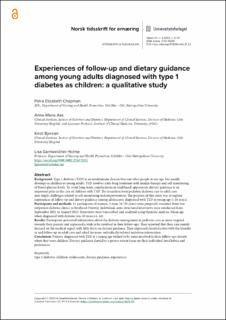Experiences of follow-up and dietary guidance among young adults diagnosed with type 1 diabetes as children: a qualitative study
Peer reviewed, Journal article
Published version
Permanent lenke
https://hdl.handle.net/11250/3097947Utgivelsesdato
2023Metadata
Vis full innførselSamlinger
Originalversjon
10.18261/ntfe.21.3.2Sammendrag
Background: Type 1 diabetes (T1D) is an autoimmune disease that can affect people at any age, but usually
develops in children or young adults. T1D involves a life-long treatment with insulin therapy and self-monitoring of blood glucose levels. To avoid long-term complications in adulthood, appropriate dietary guidance is an important pilar in the care of children with T1D. The transition from pediatric diabetes care to adult care may imply challenges related to self-monitoring and empowerment. The purpose of this study was to explore experiences of follow-up and dietary guidance among adolescents diagnosed with T1D in young age (>16 years).
Participants and methods: 11 participants (8 women, 3 men; 18–25 years) were purposely recruited from two outpatient diabetes clinics in Southeast Norway. Individual, semi-structured interviews were conducted from September 2021 to January 2022. Interviews were transcribed and analyzed using thematic analysis. Mean age when diagnosed with diabetes was 10 years (4–14).
Results: Participants perceived information about the diabetes management in pediatric care as more targeted towards their parents and expressed a wish to be involved in their follow-ups. They reported that their care mainly focused on the medical aspect with little focus on dietary guidance. They expressed dissatisfaction with the transfer to and follow-up in adult care and asked for more individually tailored nutrition information.
Conclusion: Patients diagnosed with T1D at a young age wished to be more involved in their follow-ups already when they were children. Dietary guidance should to a greater extent focus on their individual food habits and preferences.

